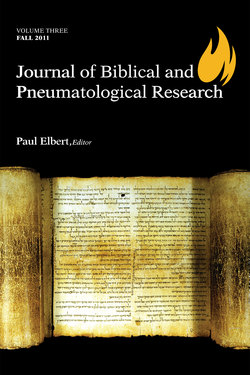Читать книгу Journal of Biblical and Pneumatological Research - Paul Elbert - Страница 4
На сайте Литреса книга снята с продажи.
Editor’s Overview of Volume 3
ОглавлениеThe strong contemporary interest in New Testament prophecy certainly complements the new discoveries and insights that a deeper understanding of Israelite prophecy may bring to the fore. Galen Goldsmith ably demonstrates this point with her new study on the cutting edge of that inspired prophetic speech and its imagery wherein the divine name plays an intriguing and heuristic role. Prophecy in the Book of Revelation continues to be mined for new insights and in this volume we are offered two studies which interact with much of the recent scholarship exploring these new insights. Rebecca Skaggs and Thomas Doyle look at details of the audio/visual component of revelation and David Seal treats the impact of aural effects on listeners to what is being revealed. Moving to Paul, Simo Frestadius gives us an insightful analysis of Paul’s interlocking connection of the Holy Spirit with the reality of divine wisdom as expressed in chapter two of First Corinthians. In keeping with the prophetic revelation of the one true God in the Old Testament, the righteousness of Yahweh and its notable characteristics are given a fresh investigation by Keith Whitt, helping to deepen both our understanding of this aspect of the divine nature and our appreciation of its efficacious direction toward us. In the narrative-rhetorical area, we are always interested in the interpretive significance of point of view and vanThanh Nguyen does not disappoint with his perceptive study of Luke’s portrayal of the Gentile mission. Our seven entries for this volume are brought to a fitting close with Lyle Story’s attention to the contextual details of how the Holy Spirit functions as a freely acting and independent communal but personal witness, a phenomenon of collective Christian experience noticed by the Jerusalem council in the Book of Acts. This interactive connection and partnership with the Spirit which can assist in overcoming ecclesiological difficulties and tensions, very briefly considered earlier by Oskar Föller,1 is given a welcome and timely examination here by Professor Story.
Our panel of critical reviewers complements well the in-depth investigations of our aforementioned authors. R. G. dela Cruz, A. Kay Fountain, Rebecca Skaggs, Thomas Doyle, James Miller, and Andrew Davis attempt to evaluate the work represented by their respective authors, while also stimulating current discussion when appropriate. On behalf of the journal’s editorial board, I am grateful for the opportunity to commend this third volume of JBPR to friends of scholarship everywhere within the biblical and theological community of scholars, teachers, pastors, missionaries, and Gospel workers.
P.E.
1. Föller’s very brief treatment categorized as “Paradoxe Wechselbeziehung und Parnerschaft: Der überwindende Geist als Gabe” appears within his broader discussion of “Der Heilige Geist und die Erkenntnis seines Wirkens in einem heilökonomisch-trinitarischen dogmatischen Entwurf in ‘ökumenischer’ Methodik,” a critique of the pneumatological dimensions of Heidelberg theologian Edmund Schlink’s ecclesiology (Oskar Föller, Charisma und Unterscheidung: Systematische und pastor-ale Aspekte der Einordning und Beurteilung enthusiastisch-charismatischer Frömmigkeit im katholischen und evangelischen Bereich [TVM; Wuppertal: Brockhaus, 1997], 238–75 [268]).
